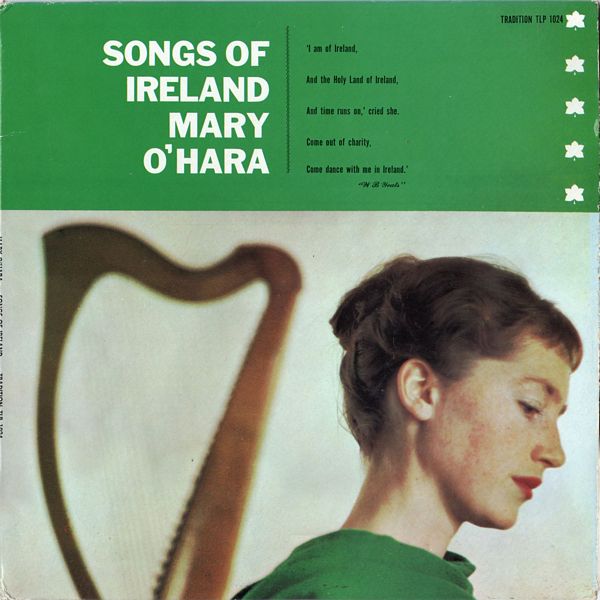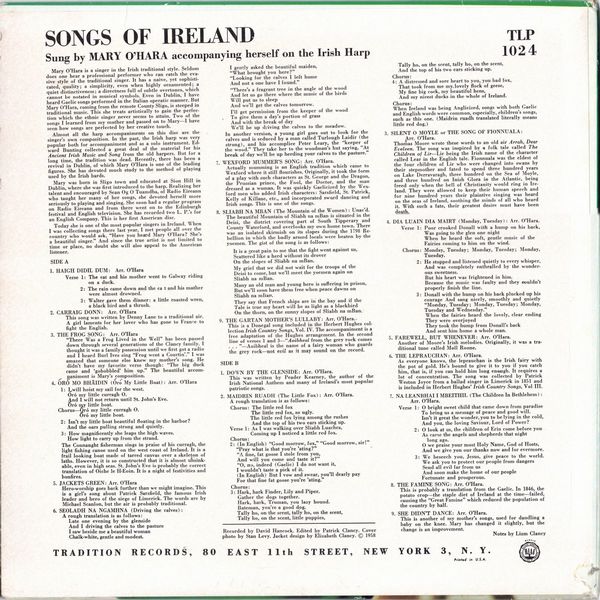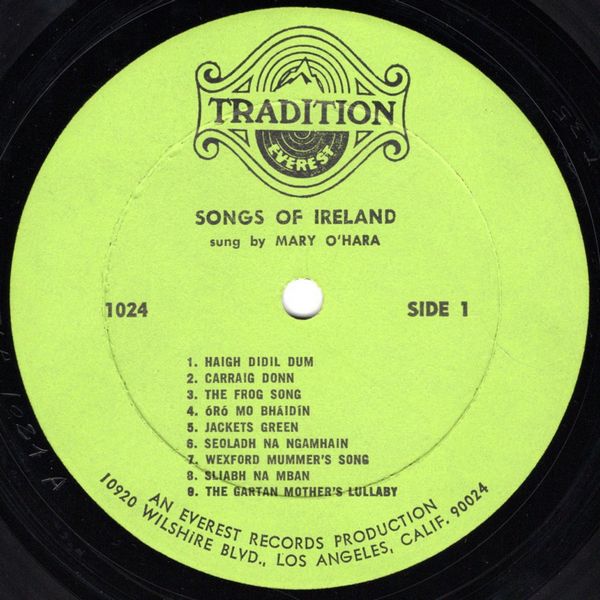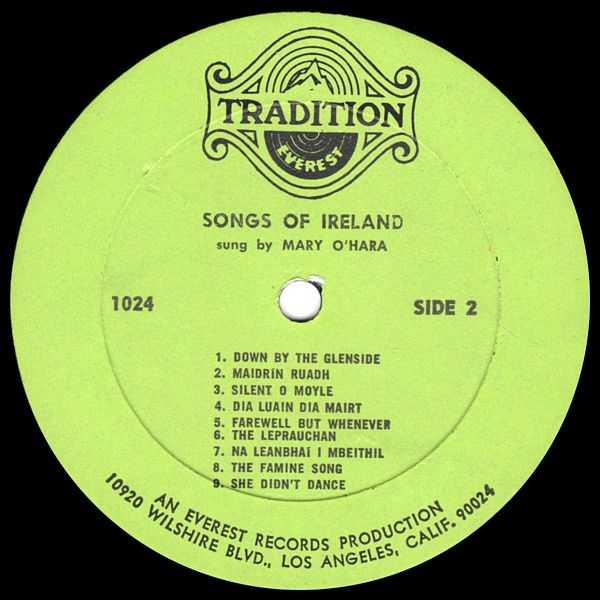

 |



|
Sleeve Notes
Mary O'Hara is a singer in the Irish traditional style. Seldom does one hear a professional performer who can catch the evasive style of the traditional singer. It has a naive, yet sophisticated, quality; a simplicity, even when highly ornamented; a quiet distinctiveness; a directness full of subtle overtones, which cannot be notated in musical symbols. Even in Dublin, I have heard Gaelic songs performed in the Italian operatic manner. But Mary O'Hara, coming from the remote County Sligo, is steeped in traditional music. This she treats artistically to gain the perfection which the ethnic singer never seems to attain. Two of the songs I learned from my mother and passed on to Mary — I have seen how songs are perfected by her creative touch.
Almost all the harp accompaniments on this disc are the singer's own composition. In the past, the Irish harp was very popular both for accompaniment and as a solo instrument. Edward Bunting collected a great deal of the material for his Ancient Irish Music and Song from the old harpers. But for a long time, the tradition was dead. Recently, there has been a revival in Dublin, of which Mary O'Hara is one of the leading figures. She has devoted much study to the method of playing used by the Irish bards.
Mary was born in Sligo town and educated at Sion Hill in Dublin, where she was first introduced to the harp. Realizing her talent and encouraged by Seán Og 0 Tuamdha, of Radio Eireann who taught her many of her songs, she devoted herself more seriously to playing and singing. She soon had a regular program on Radio Eireann and from there went on to the Edinburgh festival and English television. She has recorded two L. P.'s for an English Company. This is her first American disc.
Today she is one of the most popular singers in Ireland. When I was collecting songs there last year, I met people all over the country who would ask, "Have you heard Mary O'Hara? She's a beautiful singer." And since the true artist is not limited to time or place, no doubt she will also appeal to the American listener.
HAIGH DIDIL DIM: Arr. O'Hara
Verse 1: The cat and his mother went to Galway riding on a duck.
2: The rain came down and the ca t and his mother were almost drowned.
3: Walter gave them dinner: a little roasted wren, a black bird and a thrush.
CARRAIG DONN: Arr. O'Hara
This song was written by Denny Lane to a traditional air. A girl laments for her lover who has gone to France to fight the English.
THE FROG SONG: Arr. O'Hara
"There Was a Frog Lived in the Well" has been passed down through several generations of the Clancy family. I thought it was a family possession until we first got a radio and I heard Burl Ives sing "Frog went a Courtin'." I was amazed that someone else knew my mother's song. He didn't have my favorite verse though: "The big duck came and 'gobbled' him up." The beautiful accompaniment is Mary's composition.
ÓRÓ MO BHlIDIN (Óró My Little Boat): Arr. O'Hara
1: I will hoist my sail for the west,
Óró my little curragh O,
And I will not return until St. John's Eve.
Óró my little boat.
Chorus — Óró my little curragh O.
Óró my little boat.
2: Isn't my little boat beautiful floating in the harbor?
And the oars pulling strong and quietly.
3: How magnificently she leaps the high waves.
How light to carry up from the strand.
The Connaught fisherman sings in praise of his curragh, the light fishing canoe used on the west coast of Ireland. It is a frail looking boat made of tarred canvas over a skeleton of laths. However, it is so constructed that it is almost unsinkable, even in high seas. St. John's Eve is probably the correct translation of Oiche le H-Eoin. It is a night of festivities and bonfires.
JACKETS GREEN: Arr. O'Hara
Hero-worship goes back further than we might imagine. This is a girl's song about Patrick Sarsfield, the famous Irish leader and hero of the siege of Limerick. The words are by Michael Scanlon, but the air is probably traditional.
SEOLADH NA NGAMHNA (Driving the calves): • A rough translation is as follows:
Late one evening by the Glenside
And I driving the calves to the pasture
I saw beside me a beautiful woman
Chalk-white, gentle and modest
I gently asked the beautiful maiden.
"What brought you here?"
"Looking for the calves I left home
And not a one have I found."
"There's a fragrant tree in the angle of the wood
And let us go there where the music of the birds
Will put us to sleep
And we'll get the calves tomorrow.
I'll get permission from the keeper of the wood
To give them a day's portion of grass
And with the break of day
We'll be up driving the calves to the meadow.
In another version, a young girl goes out to look for the calves and is seduced by a man called Turlough Laidir (the strong), and his accomplice Peter Leary, the "keeper of the wood." They take her to the woodman's hut saying. "At break of day we'll be up herding your calves to the pasture."
WEXFORD MUMMER'S SONG: Arr. O'Hara.
Actually mumming is an English tradition which came to Wexford where it still flourishes. Originally, it took the form of a play with such characters as St. George and the Dragon, the Prussian prince, the Fool, the Doctor, and the man dressed as a woman. It was quickly Gaelicized by the Wexford men who added Irish characters: Sarsfield, St. Patrick. Kelly of Killane, etc., and incorporated sward dancing and Irish songs. This is one of the songs.
SLIABH NA MEAN (The Mountain of the Women): Unac'd.
The beautiful Mountain of Sliabh na mBan is situated in the Deisi, the district covering part of South Tipperary and County Waterford, and overlooks my own home town. There was an isolated skirmish on its slopes during the 1798 Rebellion in which the badly armed locals were beaten by the
yeomen. The gist of the song is as follows:
It is a great pain to me that the fight went against us,
Scattered like a herd without its drover
On the slopes of Sliabh na mBan.
My grief that we did not wait for the troops of the
Deisi to come, but we'll meet the yeomen again on Sliabh na mBan.
Many an old man and young hero is suffering in prison,
But we'll soon have them free when peace dawns on Sliabh na mBan.
They say that French ships are in the bay and if the
Tale is true my heart will be as light as a blackbird
On the thorn, on the sunny slopes of Sliabh na mBan.
THE GARTAN MOTHER'S LULLABY: Arr. O'Hara.
This is a Donegal song included in the Herbert Hughe* collection Irish Country Songs, Vol. IV. The accompaniment is a free adaptation of the Hughes arrangement. In the second line of verses 1 and 3 — "Aoibheal from the grey rock comes . . . " — Aoibheal is the name of a fairy woman who guards the grey rock — not evil as it may sound on the record.
DOWN BY THE GLENSIDE: Arr. O'Hara.
This was written by Peader Kearney, the author of the Irish National Anthem and many of Ireland's most popular patriotic songs.
MAIDRIN RUADH (The Little Fox): Arr. O'Hara. A rough translation is as follows:
Chorus: The little red fox
The little red fox, so ugly.
The little red fox lying among the rushes
And the top of his two ears sticking up.
Verse 1: As I was walking over Sliabh Luachra.
Coming up I noticed a little red fox.
Chorus:
2: (In English) "Good morrow, fox," "Good morrow, sir!"
"Pray what is that you're 'ating?"
"A fine, fat goose I stole from you,
And will you come and taste it?"
"O, no, indeed (Gaelic) I do not want it,
I wouldn't taste a pick of it.
(In English) But I vow and swear, you'll dearly pay
For that fine fat goose you're 'ating."
Chorus:
3: Hark, hark Finder, Lily and Piper.
Gather the dogs together.
Hark, hark, Truman, you lazy hound.
Bateman, you're a good dog.
Tally ho, on the scent, tally ho, on the scent.
Tally ho, on the scent, little puppies,
Tally ho, on the scent, tally ho, on the scent,
And the top of his two ears sticking up.
Chorus:
4: A distressed and sore heart to you, you bad fox,
That took from me my, lovely flock of geese,
My fine big cock, my beautiful hens,
And my nicest ducks in the whole of Ireland.
Chorus:
When Ireland was being Anglicized, songs with both Gaelic and English words were common, especially, children's songs, such as this one. (Maidrin ruadh translated literally means little red dog.)
SILENT O MOYLE or THE SONG OF FIONNUALA: Arr. O'Hara.
Thomas Moore wrote these words to an old air Arrah, Dear Eveleen. The song was inspired by " folk tale called The Children of Lir-Lir being the Irish name of the character called Lear in the English tale. Fionnuala was the eldest of the four children of Lir who were changed into swans by their stepmother and fated to spend three hundred years on Lake Derravaragh, three hundred on the Sea of Moyle, and three hundred on Inish Glora in the Atlantic, being freed only when the bell of Christianity would ring in Ireland. They were allowed to keep their human speech and for nine hundred years their plaintive singing was heard on the seas of Ireland, soothing the minds of all who heard it. With such a fate, their greatest desire must have been death.
DIA LUAIN DIA MAIRT (Monday, Tuesday): Arr. O'Hara.
Verse 1: Poor crooked Donall with a hump on his back,
Was going to the glen one night
When he heard the soft, gentle music of the
Fairies coming to him on the wind.
Chorus: Monday, Tuesday; Monday, Tuesday; Monday, Tuesday.
2: He stopped and listened quietly to every whisper,
And was completely enthralled by the wonderous sweetness.
But his heart was frightened in him.
Because the music was faulty and they couldn't properly finish the line.
3: Donall with the hump on his back plucked up his courage And sang nicely, smoothly and quietly "Monday, Tuesday; Monday, Tuesday; Monday, Tuesday and Wednesday."
When the fairies heard the lovely, clear ending
They were overjoyed
They took the hump from Donall's back
And sent him home a whole man.
FAREWELL, BUT WHENEVER: Arr. O'Hara.
Another of Moore's Irish melodies. Originally, it was a traditional tune called Moll Roone.
THE LEPRAUCHAN: Arr. O'Hara.
As everyone knows, the leprauchan is the Irish fairy with the pot of gold. He's bound to give it to you if you catch him, that is, if you can hold him long enssagh. It requires a lot of concentration. The song was collected by Patrick Weston Joyce from a ballad singer in Limerick in 1851 and is included in Herbert Hughes' Irish Country Songs, Vol III.
NA LEANBHAII MBEITHIL (The Children In Bethlehem): Arr. O'Hara.
Verse 1: O bright sweet child that came down from paradise
To bring us a message of peace and good will.
Isn't it great the wonder, you to be lying in the cold,
And you, the loving Saviour, Lord of Power?
2: O look at as, the children of Erin come before you
As came the angels and shepherds that night long ago.
O we praise your most Holy Name, God of Hosts.
And we give you our thanks now and for evermore.
3: We beseech you, Jesus, give peace to the world.
We ask you to protect our people from dangers
Send all evil far from us
And soon make the home of our people
Fortunate and prosperous.
THE FAMINE SONG: Arr. O'Hara.
This is probably a translation from the Gaelic. In 1846, the potato crop — the staple diet of Ireland at the time — failed. causing the "Great Famine" which reduced the population of the country by half.
SHE DIDN'T DANCE: Arr. O'Hara.
This is another of my mother's songs, used for dandling o baby on the knee. Mary has changed it slightly, but the change is an improvement.
Notes by Liam Clancy